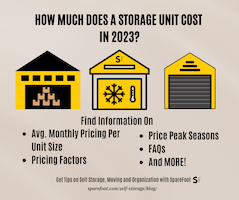When you think about moving, it often conjures images of cardboard boxes, bubble wrap and maybe a truck or two. But there’s a whole financial side to consider. Do you know what falls under moving expenses? Are moving expenses tax deductible? If so, then what moving expenses are deductible and which ones fall short? Let’s start from the beginning.
What Are Moving Expenses?
The cash you shell out when switching to a new living space is considered part of “moving expenses”. Of course, it does not include the actual price tag of your new home or the change of wardrobe. At the same time, it isn’t just about hiring those big trucks or professional movers either.
Those are indeed a big chunk, but moving expenses also cover a lot of small things — like those cardboard boxes you need loads of or the protective bubble wrap for your precious vase. Traveling a long distance? Oh, there’s gas, maybe some toll fees, and if it’s a real long haul, you could be booking a hotel for the night.
Are Moving Expenses Tax Deductible?
Once upon a time, people could wiggle their moving costs into their tax deductions if they relocated for work. Sounds great, right? But in 2017, things took a twist. The Tax Cuts and Jobs Act (or TCJA, because who doesn’t love a good abbreviation?) changed the rules of the game.
From 2018 onward, most folks were left waving goodbye to these tax perks. But, and here’s the catch, if you’re serving in the military or have a loved one who does, you may still be eligible.
Only for Active-Duty Military
The IRS, via their Form 3903 (which you attach to Form 1040), says that if you are an active-duty military member and you are told it’s time to move duty stations, you can still get those moving expenses deducted. And not just for you — moving expenses for spouses and dependents qualify too. That’s because people at the IRS understand that serving in the military often means packing your bags and moving more often than most. Before you start dreaming of deductions, see if you can tick any of these boxes:
- Were you ordered to move to a new base and simply had to do it?
- Are you the spouse or a dependent of active military personnel and you had to pack up because of their job change?
- Did you hang up your boots recently and decided to relocate within a year?
- Or, and this is a touchy one, are you the spouse or dependent of someone in the military who sadly passed away, faced imprisonment or left without a trace?
What About Non-Military?
Alright, for the everyday Joe and Jane, the TCJA threw a wrench into those sweet moving expense deductions. Remember when you could relocate for work and shave off some of those costs from your taxes? That chapter is, well, mostly closed. But let’s have a quick flashback. Before the TCJA came into play:
- You could nab those deductions if your company wasn’t picking up the moving tab or reimbursing you for it.
- The new job had to be a fair bit away from your old home base — by at least 50 miles.
- And yep, there was a timer. You had to rack up enough hours at the new gig in the months that followed; 39 weeks during the first 12 months after moving, to be more specific.
However, the landscape has changed. Non-military? It’s more of a “Thanks, but no thanks” from the IRS. But hold on a second: If you made a move before 2018 and missed out on claiming those bucks, there might be a silver lining. Look over your old records and, if you have qualifying moving expenses, you may be able to amend a previous return. Generally, you can amend returns within three years, but there are exceptions to this rule, so ask a tax preparer about your particular situation.
Note: These states allow moving expense deductions: Arkansas, California, Hawaii, Massachusetts, New Jersey, New York and Pennsylvania. Of course, this only applies to state tax returns and not federal ones.
What if the Employer Paid for My Move?
First things first, if you’re not rocking that military uniform on active duty, any hopes of squeezing moving expenses into your tax deductions are kind of, well, kaput. There is one more important thing to keep in mind. Did your employer stepped in and said they would handle the expense of your move, it’s not entirely free money.
In the big ol’ world of taxes, the TCJA sees those moving funds from your employer as something extra in your paycheck. Yup, it may be considered taxable income. That means when tax season rolls around, you will have another line item to jot down. But remember, if you are an active-duty military personnel who received moving expense reimbursements from the government, those funds are not considered taxable income.
Which Moving Expenses Are Tax Deductible?
Alright, so for the chosen few who can still play the “deduct my moving expenses” card (looking at you, active-duty military stars), let’s unravel the mystery of what you can actually chalk up as a deductible.
Everything You’ve Moved from Point A to Point B
This one’s about the physical things. We’re talking about costs related to hauling that trailer, all the packing, boxing and unboxing and keeping your stuff safe in-transit.
Stashing and Guarding Your Belongings
Got a gap between moving out and moving in? Let’s say you pack up and your stuff is on its way, but not to your new home just yet. The cash you spend to keep your things safe and sound in storage? Well, for 30 days straight after they wave goodbye to your old home, that can count in your deductible expenses. Just to be clear, that means both storage and insurance, but it no longer applies once it’s past 30 days.
The Journey Itself
And now, the adventure of getting you and yours from the old stomping ground to the new digs. You can deduct:
Driving expenses. Whether you’re filling up on gas or oil, or dishing out cash for tolls and parking, better keep those receipts. As of June 30, 2022, there’s a handy 22 cents-a-mile rate, but if you want to note down every penny spent, that works too.
Flying expenses. If you decided the car is just not fast enough and took to the air, that airfare is deductible.
Lodging expenses. If the journey is a long one and you grabbed a hotel room (or two), you can jot down those costs.
Which Moving Expenses Are Not Tax Deductible?
It’s time we talked about the things that, unfortunately, won’t score you a tax deduction, even if you’re sporting military stripes. Don’t blame it on us, it’s the IRS.
Car concerns unrelated to the actual driving. Whether it’s general maintenance, repairs, insurance or even those new car tags and your driver’s license — they’re off the table. Plus, any depreciation on your car doesn’t get the green light either.
Travel tidbits. Hungry? Well, those meal expenses during the move aren’t deductible. And if you went on a fun detour or splashed out on a ritzy hotel, those costs are again on you. Return trips to your former residence? Not part of moving.
New home hassles. That shiny new home cost and everything around it? Like refitting carpet, closing costs, mortgage fees and penalties or the losses from selling your previous place? Not deductible as moving expenses. And just to mention, any home improvements to sell your old place or costs from breaking/entering a lease are also a no.
Goods on the go. If you picked up some new furniture or other items en route to your new place, those moving costs are yours to bear. Also, no cutting corners with those storage charges, unless they are strictly for transit (the previously mentioned 30-day rule) or related to foreign moves.
Government graces. If the government provided moving services or gave you an allowance (which you didn’t count as income), those aren’t eligible for deductions.
In essence, stick to the core costs of moving. Extras, luxuries or unrelated fees? They won’t slide into the deduction zone no matter how hard you try.
How Do I Deduct Moving Expenses?
Ready to start with those moving deductions? If you’ve got the green light in terms of eligibility, it’s time to get down to business early because you have to make sure you save all receipts and invoices related to the move. Now let’s get to filling in Form 3903 line by line.
Line 1. Record expenses for packing, crating, moving, storing and insuring your household items.
Line 2. Log your travel costs from the old to the new home, including transportation and lodging. If you used your personal vehicle, account for gas, oil or mileage. Add any parking fees and tolls. Do not include the cost of meals.
Line 3. Just add lines 1 and 2.
Line 4. Enter the total allowances or reimbursements from the government for your expenses on lines 1 and 2. This shouldn’t include the value of services provided by the government or certain allowances. The amount excluded will be marked on Form W-2, box 12, with code P.
Line 5. If line 3 is greater than line 4, the difference is your moving expense deduction. Record it on both Line 5 of Form 3903 and Schedule 1 (Form 1040), line 14. If line 3 is equal to or less than line 4, there’s no deduction. If there’s a positive difference when subtracting line 3 from line 4, note it on Form 1040, 1040-SR or 1040-NR, line 1h.
Top 7 Ways To Save On Your Move
Moving is about boxes, trucks and, yes, money. And we all like saving where we can, right? So, while TCJA made sure we can’t knock on the tax door for all moving deductions anymore, we sure can be smart about cutting those moving costs.
- Early planning. The earlier you start, the more time you have to budget, anticipate costs and tackle tasks gradually. This can reduce last-minute expenses and stress.
- Shop around for movers. Don’t settle for the first moving quote you receive. By comparing multiple estimates, you can identify the most economical and reliable service. Pay attention to any potentially hidden costs before making a decision.
- Declutter before the move. A lighter move is often a cheaper one as you might go down a truck size. Sell, donate or recycle items that you no longer want or need.
- DIY packing. By packing your belongings on your own, you save on labor costs. And instead of buying packing materials, you can use what you already have. Blankets, towels and clothing can protect fragile items, and boxes can be sourced from local businesses or friends.
- Look beyond moving deductions. Although the TCJA has restricted moving deductions, other tax incentives may apply. Research options like the home office deduction, or credits for energy-efficient home improvements.
- Consider off-peak moving. If your moving date is flexible, schedule it during off-peak times, like weekdays or outside of summer months, to potentially get better rates.
- Secure insurance. While it may seem like an added expense, proper insurance can save you from the high costs of damaged or lost belongings during the move.
Of course, always consider the balance between cost and convenience. Sometimes paying a bit extra can save a lot of time and stress.


